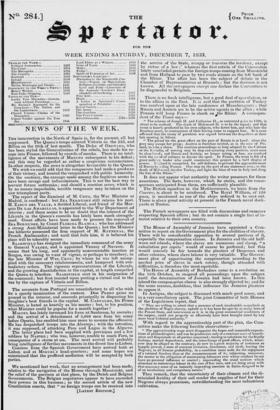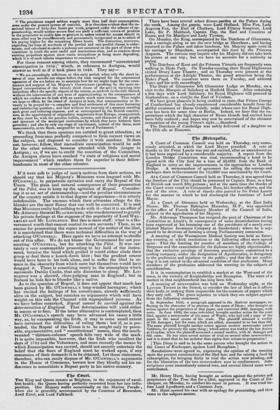The House of Assembly of Jamaica have appointed a Com-
mittee to report on the Government plan for the abolition of slavery. There will be considerable opposition to several portions of it, especially the compensation clause. In Jamaica and the old half- worn out islands, where the slaves are numerous and cheap, "a calculation per capita" would of course be preferred; but this would scarcely be fair towards the planters of Demerara and other colonies, where slave labour is very valuable. The Govern- ment plan of apportioning the compensation according to the market price of slaves in each colony, though attended with difficulties, is therefore the most equitable. The House of Assembly of Barbadoes came to a resolution on the lath October, to suspend all proceedings upon the subject until the determination of Jamaica had been known. In this island the compensation clause is also strongly objected to; and for the same reasons, doubtless, that influence the Jamaica planters to oppose it.
In Antigua, the subject is discussed with much good sense, and in a very conciliatory spirit. The joint Committee of both Houses of the Legislature report, that
" They are ivilling to admit that a measure of such incalculable magnitude as the abolition of Negro slavery, upheld as it has been for ages by so many laws of the Parent State, and interwoven as it is in the great commercial machinery of the empire, could not properly or effectively have been brought about by any mere local Colonial authority."
With regard to the apprenticeship part of the plan, the Com- mittee make the following forcible observations-
" The apprenticeship stage must disappoint the hopes and reasonable expecta. tons of philanthropists, and can be productive only of a constant sense of humili- ation and disquietude to all parties concerned ; tending to substitute for the kindly feelings, mutual dependence, and the interchange of good offices, which, what- ever may be alleged to the contrary, do now in a great majority of instances so happily prevail, a state of constant irritation, discontent, and strife, leaving the Negroes, in all human probability, in a condition more unfit for the enjoyment of a rational freedom than at the commencement of it; subjecting, moreover, the master to the obligation of maintaining labourers over whose conduct he can have no personal influence or control ; superseding the usual motives which stimulate to industrious labour in the case of free men, and yet doing away with that necessary sense of an instantly impending coercion in duties designed to be of an involuntary and compulsory nature."
They remark, that the uncertainty of their climate and the di- minished fertility of their soil render the supplies of food for their Negroes always precarious, notwithstanding the most industrious cultivation.
" The provisions reaped seldom supply more than half their consumption, even under the present system of coercion. it is therefore evident that the re- stricted labour of forty-five hours per week, proposed under the scheme of ap- prenticeship, would neither secure food nor yield a sufficient return of produce to the proprietor to enable him to procure it, unless indeed his means should in some other way be simultlineously.and permanently invigorated so as to admit of his paying higher for the remaining fifteen hours. The distinction, moreover, regarding the time of servitude of the predial and non-predial classes is unfor- tnnate, and calculated to excite a jealousy not unnatural on the part of those who constitute in truth the most useful and meritorious class, and to confirm those existing prejudices against mere rustic occupations as being more degrading, which it is of such infinite importance to counteract."
For these reasons among others, they recommend "unrestricted emancipation in 1834;" which, in reference to Antigua, would answer as well as if it took place in 1840. They soy-
a We are exceedingly solicitous at this early period, when only the short in- terval of nine months can elapse before the time assigned for the commenced operation of the act before us, to ascertain how far we might hope for the coun- tenance and support of his Majesty's Government (profiting by the more en- larged interpretation of the twenty third clause of the act) in carrying into immediate effect the specific objects of the statute, as set forth in the title thereof, without the intervention of any term of appren„ticeship, to the consequences of which we confess we do look with an anxiety much more intense. Thus might we hope to effect, for the island of Antigua at least, that consummation so e- ',Gutty to be prayed for—a complete and final settlement of this most harassing and embittering question ; and that without the necessity of a measure entailing such great and enduring expense, and so unrecognized by the British constitu- tion, as the appointment of stipendiary magistrates from Europe, unacquainted, as they must be, with the peculiar habits, customs, and character of the people, and ignorant Of the municipal institutions by which they have hitherto been governed ; and also by only one stage of excitement, instead of the three, most unnecessarily, as we think, assigned for us by act of Parliament."
We think that these opinions are entitled to great attention; as proceeding from men perfectly competent to form correct views on the subject, and disposed to consider it 'with candour. It does net, however, follow, that immediate emancipation would be safe for the other colonies, because attended with little danger in Antigua ; as, if we are to credit the assertion of the Committee, the Antigua slaves have reached "a state of religious and moral improvement " which renders them far superior to their fellow- bondsmen in most of the other colonies.

















 Previous page
Previous page